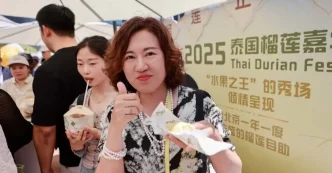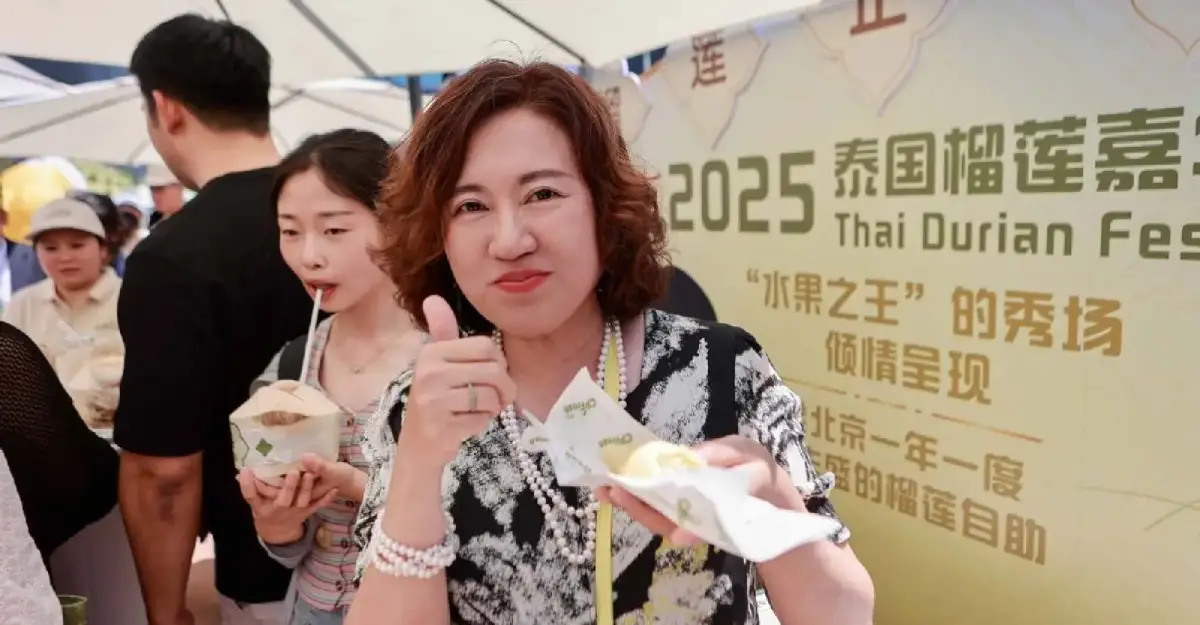Beijing recently hosted the launch of the 2025 Thailand Durian Carnival and China-Thailand Fruit Week, a vibrant event aimed at deepening agricultural cooperation between the two nations. Held over the weekend, the initiative seeks to boost regional fruit trade and foster exchanges in agricultural practices, spotlighting Thailand’s tropical fruits—particularly the iconic durian—as a cornerstone of bilateral economic ties.
Agricultural Diplomacy in Bloom
The event, which runs until Sunday, was organized by the Foreign Economic Cooperation Center at China’s Ministry of Agriculture and Rural Affairs, alongside the Thai embassy in China and the Charoen Pokphand (CP) Group, a major Thai conglomerate with deep roots in agribusiness. Showcasing a variety of fruits such as durians, tender coconuts, mangosteens, peaches, lychees, and watermelons, the carnival also featured a simultaneous China-Thailand fruit pop-up market, offering visitors a taste of both countries’ agricultural bounty.
Wei Zhenglin, an official from the ministry’s Department of International Cooperation, highlighted the significance of this partnership during the opening ceremony. He noted that China has long been Thailand’s largest export market for fruit, as well as its primary source of fruit imports. “China will step up efforts to facilitate the export of Thai durians and other fruits” said Wei, emphasizing a commitment to expanding agricultural exchanges not only with Thailand but also within the broader Lancang-Mekong region, a cooperative framework involving six countries along the Mekong River.
Thai Ambassador to China, Chatchai Viriyavejakul, echoed this sentiment, underscoring the cultural and agricultural bonds between the two nations. “The event will allow participants to experience a culinary collision” he said, pointing to the carnival as a platform for mutual understanding through food and trade. His remarks reflect a broader trend of using agricultural events as a form of soft diplomacy, strengthening ties through shared economic interests and cultural appreciation.
The Durian Economy: A Fruitful Trade
At the heart of this collaboration is the durian, often dubbed the “king of fruits” for its pungent aroma and rich, custardy texture. Thailand is one of the world’s leading exporters of durian, and China represents a massive and growing market for the fruit. In recent years, the demand for Thai durians in China has skyrocketed, driven by a burgeoning middle class with an appetite for exotic tropical produce. This trade relationship has become a linchpin of Thailand’s agricultural export economy, with durians alone generating significant revenue each year.
The economic stakes are high. While exact figures for 2025 are yet to be finalized, historical data suggests that Thai fruit exports to China, led by durians, have consistently contributed billions of Thai Baht to the economy. For instance, a single durian can fetch prices upwards of 500 Thai Baht (US$14) in Chinese markets, depending on quality and seasonality. This trade not only supports Thai farmers but also bolsters logistics, packaging, and export industries, creating a ripple effect across multiple sectors.
China’s commitment to facilitating imports, as articulated by Wei, could further streamline this process. Simplified customs procedures, reduced tariffs, and improved cold-chain logistics are among the measures that might be prioritized. If implemented effectively, these steps could increase the volume of Thai fruits entering China, benefiting producers and consumers alike. However, challenges such as phytosanitary regulations and market saturation remain, requiring ongoing dialogue between the two governments.
Beyond Economics: Cultural Exchange and Regional Impact
The Thailand Durian Carnival is more than a trade fair; it serves as a cultural bridge between China and Thailand. Visitors to the event in Beijing were treated to a sensory experience, tasting fruits in self-service areas and exploring displays of tropical produce curated by the CP Group. Such interactions foster a deeper appreciation of Thai culture among Chinese consumers, many of whom associate durians with luxury and festivity.
This cultural exchange aligns with broader regional initiatives like the Lancang-Mekong Cooperation framework, which seeks to promote sustainable development and economic integration among Cambodia, Laos, Myanmar, Thailand, Vietnam, and China. Agriculture plays a pivotal role in this vision, as the Mekong region is a global hub for rice, fruits, and fisheries. By focusing on fruit trade, events like the Durian Carnival contribute to a shared economic agenda, potentially paving the way for collaborative projects in irrigation, technology transfer, and climate-resilient farming.
Yet, the benefits are not without caveats. As trade intensifies, so do concerns about environmental sustainability. Durian cultivation, particularly in Thailand, has been linked to deforestation and water overuse in some areas. While no specific evidence ties the carnival’s showcased fruits to such practices, the broader industry faces scrutiny over its ecological footprint. Both Thai and Chinese authorities may need to address these issues through stricter regulations or incentives for sustainable farming if the trade boom is to remain viable in the long term.
Market Dynamics and Consumer Trends
The China-Thailand fruit pop-up market, running alongside the carnival, offered a glimpse into evolving consumer trends. Thai durians, mangosteens, and coconuts were displayed alongside Chinese peaches and lychees, highlighting a mutual interest in diversifying fruit offerings. For Chinese consumers, Thai fruits represent an affordable luxury, often purchased as gifts during festivals or as status symbols at social gatherings.
Conversely, Thai markets have seen a growing presence of Chinese fruits, reflecting a two-way trade dynamic. This reciprocity strengthens the economic interdependence between the two nations, with potential spillover effects for other ASEAN countries. For instance, if China’s facilitation of Thai imports sets a precedent, neighboring countries like Vietnam or Malaysia—also major fruit exporters—might seek similar arrangements, reshaping regional trade patterns.
However, market access is not without hurdles. Thai exporters must navigate stringent Chinese import standards, including pest control measures and quality certifications. While the Durian Carnival promotes goodwill, behind-the-scenes negotiations on trade protocols will determine the long-term success of such initiatives. Analysts suggest that joint ventures, such as those involving the CP Group, could play a critical role in aligning standards and building trust between stakeholders.
Geopolitical Context and Future Prospects
The timing of the 2025 Durian Carnival coincides with a period of heightened economic collaboration between China and ASEAN nations, driven in part by frameworks like the Regional Comprehensive Economic Partnership (RCEP). As the world’s largest free trade agreement, RCEP reduces barriers for agricultural goods, potentially amplifying the impact of events like the carnival. For Thailand, this presents an opportunity to solidify its position as a key supplier of tropical fruits to China, a market of over 1.4 billion people.
Geopolitically, agricultural trade offers a relatively neutral ground for cooperation amid broader tensions in the South China Sea and other regional disputes. By focusing on shared economic interests, China and Thailand can build trust and stability, even as other issues loom large. If successful, the carnival could serve as a model for similar initiatives with other ASEAN countries, reinforcing China’s role as a regional economic leader while providing tangible benefits to Thai farmers and exporters.
Looking ahead, questions remain about how this partnership will evolve. Will China’s facilitation efforts translate into measurable gains for Thai fruit exporters? Can environmental concerns be addressed without stifling growth? And might other fruits, beyond durian, emerge as new symbols of this cross-border collaboration? As the 2025 Thailand Durian Carnival unfolds in Beijing, it offers a tantalizing glimpse of a future where agriculture continues to bind nations together, one fruit at a time.















